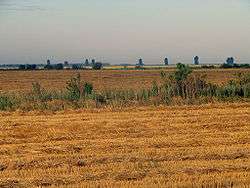Agriculture in Romania


Romania has an agricultural capacity of approximately 14.7 million hectares, of which only 10 are used as arable land. In November 2008, an evaluation revealed that 6.8 million hectares are not used.[1]
Agriculture summed up about 6% of GDP in 2007, down from 12.6% in 2004. As of August 2009, approximately 3 million people (close to 30% of the country's workforce) are employed in agriculture, compared to 4-5% in other Western countries. Mechanization is comparatively poor, with one tractor available for every 54 hectares, while the EU average is one tractor for every 13 hectares.[2] Approximately 170,000 tractors exist in Romania, of which about 80% are aging or obsolete.[2]In many regions of the country, farmers still use horse-drawn agriculture tools and relay on animal power. Unlike Western Europe, where tractors are replaced after 3,000-4,000 hours of use, in Romania they sometimes last up to 12,000 hours.[2]
The main problems encountered by Romanian agriculturists are a lack of major investments in agriculture, due to difficulty in accessing available funds, fragmentation and erosion of soil, property-related lawsuits and obsolete technology. Several major companies have entered the Romanian market, including Smithfield Foods, Cargill, Bunge, Glencore, Lactalis and Meggle. These companies have since invested hundreds of millions of euros in Romania.
Production
According to the National Statistics Institute, in 2006 991,000 ha of sun-flower and 191,000 ha of soybean were cultivated. Cereal production in 2006 stood at 15.1 million tons, including 5.3 million tons of wheat and 8.6 million tons of maize.[3] In 2007, a severe drought destroyed over 60% of crops. Wheat production subsequently fell to 3 million tons, and prices fell 25%. Analysts claimed it was the worst harvest since 1940.[4]
| Production year | 2000 | 2001 | 2002 | 2003 | 2004 | 2005 | 2006 | 2007 | 2008 | 2009 | 2010 | 2011 |
|---|---|---|---|---|---|---|---|---|---|---|---|---|
| Wheat | 4434 | 7735 | 4421 | 2479 | 7812 | 7340 | 5526 | 3044 | 7181 | 5202 | 5587 | 7192 |
| Potatoes | 3469 | 3997 | 4077 | 3947 | 4230 | 3738 | 4015 | 3712 | 3649 | 4004 | 3258 | 4113 |
| Sunflower | 720 | 823 | 1002 | 1506 | 1557 | 1340 | 1526 | 546 | 1169 | 1098 | 1264 | 1864 |
| Tomatoes | - | 651 | 658 | 818 | 805 | 379 | 571 | 407 | 536 | 470 | 414 | 560 |
| Apples | - | 507 | 491 | 811 | 1097 | 611 | 579 | 472 | 455 | 513 | 543 | 624 |
Cereal, fruit and vegetable production: (thousands of tons)[5]
Through the Common Agricultural Policy, Romania will receive 14.5 billion euros between 2007 and 2013, according to statements made by the World Bank.
Romanian agricultural research
Agricultural research in Romania developed mainly through the Agronomical Research Institute (founded 1927), and post-World War II through its successor, the Research Institute for Cereals and Industrial Crops. Some of the main Romanian agricultural scientists include Ion Ionescu de la Brad, Gheorghe Ionescu-Sisești, Nicolae Săulescu, Nichifor Ceapoiu, Zoe Țapu, Alexandru-Viorel Vrânceanu, Cristian Hera, Nicolae N. Săulescu, and others.[6][7]
References
- ↑ 6,8 milioane de hectare agricole nu sunt lucrate, standard.ro, accesat la 6 mai 2009
- 1 2 3 Chinezii încep producţia de tractoare la Râşnov Archived 13 September 2009 at the Wayback Machine., standard.ro, accesat la 11 septembrie 2009
- ↑ Holdingul Agro Chirnogi imprumuta noua mil. € pentru a-si extinde culturile agricole, Accesat la 4 mai 2009
- ↑ Graul din noua recolta va fi cu 25 % mai ieftin
- ↑ http://epp.eurostat.ec.europa.eu
- ↑ INCDA Fundulea – Câteva din rezultate: ameliorare și genetică
- ↑ Săulescu N. N., Ittu G., Ittu Mariana, Mustățea P. Cinci decenii de ameliorare a grâului la Fundulea